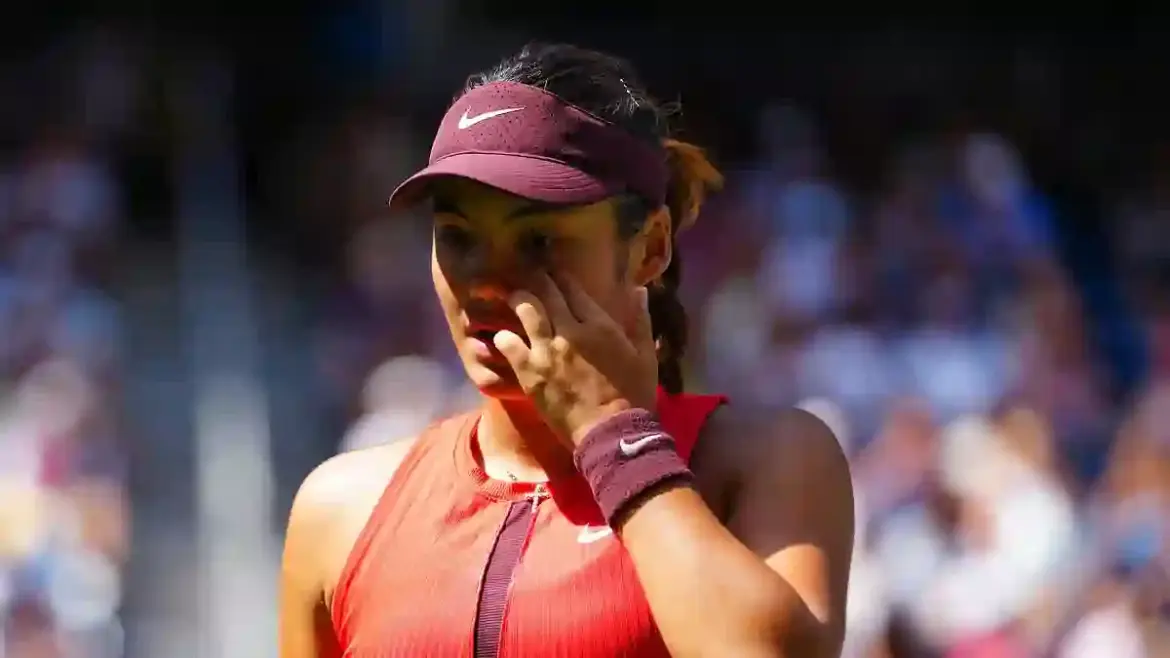Emma Raducanu’s 2025 Grand Slam campaign hit a familiar stumbling block at the US Open, reminding fans just how tough the elite tier of women’s tennis can be.
After a string of disappointing exits in Melbourne, Paris, and Wimbledon, the British No 1 was defeated once again by a top player, sparking discussion about whether the game’s best are raising their level whenever they face her.
Another Quick Exit in New York
Raducanu’s third-round clash against Elena Rybakina ended in a 6-1, 6-2 loss, marking her fastest-ever defeat in a Grand Slam at just over an hour.
For a player who stunned the world by winning the US Open in 2021, these results are hard to digest—but Raducanu isn’t shy about analyzing her own performance.
After falling to Iga Swiatek in both Melbourne and Paris, and then facing a tighter contest with Aryna Sabalenka at Wimbledon, Raducanu has yet to advance beyond the third round this season.
Across a dozen encounters with the so-called “Big Four” of women’s tennis—Swiatek, Sabalenka, Rybakina, and Coco Gauff—she has yet to record a win, taking only a single set.
Feeling the Pressure From the Elite
When asked if she feels the top players elevate their game against her, Raducanu didn’t hold back:
“Yeah, big time. I think when the very top play against me, they have a point to prove that they’re at the top for a reason.
Every time I’ve played one of them, they’ve shown that.”
She acknowledged the challenge as part of her growth:
“While I’m improving, doing better, gaining maybe some more respect, I think the top have definitely raised their game.
But I’ll take that as a compliment that they’ve decided to really lock in against me, but at the same time it does show I have a lot more work to do.”
Rybakina’s Dominance on Display
Rybakina was sharper and more precise than she had been against 18-year-old qualifier Tereza Valentova in the second round.
Raducanu, who had been almost flawless up to this point—losing only six games and not dropping a serve—found herself completely outmatched.
Her new coach, Francis Roig, has worked with her for just three weeks, and there were signs of improvement.
Still, Raducanu struggled to dictate play and capitalize on Rybakina’s off-day with her serve, landing only 47% of first serves.
Inconsistency in Raducanu’s positioning—sometimes hanging back, other times stepping in—prevented her from fully exploiting opportunities.
As commentator Laura Robson noted, “Raducanu wasn’t committed tactically.
At times it looked like she was trying to hit big, but then the next point she’d take half a step back.”
Lessons From a Tough Match
Raducanu admitted the difficulty of finding rhythm:
“I found it very difficult to get any sort of rhythm.
So when I did have a ball, it was hard for me to all of a sudden hit a quality shot and capitalize on the few moments I had.”
A key moment came in the opening game of the second set, where she was broken from 40-0 up, giving away five unforced errors, three on her favored backhand.
She explained the challenge of facing top players:
“Every time I’ve played Iga and Elena, they’ve played unbelievable.
The ball just comes through really, really fast and you feel like you don’t have any time to create anything, it’s just constant pressure.”
Looking Ahead With Positivity
Despite the loss, Raducanu and Roig can take encouragement from eight wins in 12 matches across North America this summer.
Raducanu is focused on continuing her work with Roig, whose contract currently runs until the end of the season:
“Right now we’re working through to the end of the year. I’m looking forward to getting back to work.
It’s only been three weeks but I think we’ve made good improvements. Certain parts of my game have gotten better for sure.
Today my weaknesses were highlighted, but it’s only been three weeks and he can’t work miracles.”
British Men’s Draw Update
On the men’s side, British No 2 Jacob Fearnley fell to Alexander Zverev, 6-4, 6-4, 6-4, leaving the UK’s singles hopes on Cam Norrie’s shoulders.
Norrie is set to face Novak Djokovic under the lights at Arthur Ashe Stadium, carrying the weight of British expectations in the later rounds.



